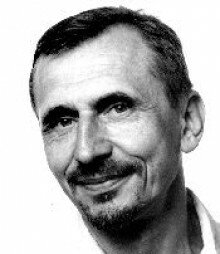
Mykola Ryabchuk is one of the Ukraine’s most important intellectuals, although his name seems to be much better known abroad than at home. His first book of poetry was published when he was 36 and his first collection of short stories when he was 49. Since 2000 he has been publishing books of political analysis. Each of them has immediately been translated into several European languages.
Ryabchuk holds a number of prestigious awards, including “Book of the Year” Awards in 2000 and 2003, the POLCUL Award in 1998, the Polish-Ukrainian Capitula Award in 2002, for his contribution to Polish-Ukrainian reconciliation, and the Antonovych Prize in 2003, for exceptional achievement in the Ukrainian humanities.
He was born in Lutsk in the Western Ukraine, but grew up and studied in Lviv. In 1973, in his third year of study, he was expelled from the Polytechnic Institute, where he was studying electrical engineering, for contributing to an unauthorized publication – samvydav (or samizdat in Russian).
Over the course of the next decade he took jobs as a railway construction worker, a theatre electrician, a loader at a printing works, among others. In 1985, as perestroika was advancing, he began studying at the extra-mural department of Gorky Literary Institute in Moscow, and graduated from there in 1988 with an honours degree.
This year also became a turning-point for Ryabchuk: “I haven’t written a line since 1988,” he says in the interview on this site, “and have no intention ever to resume this business”. His poems and short stories, banned for decades, appeared in print only after perestroika began. In 1989 his first and only book of poetry, Zyma u Lvovi (Winter in Lviv), selected from the years 1971 to 1988, was published in Kyiv, where he had moved by that time. Today he does not even have a single copy of it himself. His selected short stories appeared in 2002.
The end of poetry-writing – but not of thinking as a poet, as he acknowledges in the interview for PIW – together with the collapse of the Soviet Union opened up a new era in Ryabchuk’s career. From 1985 to 1994 he was an editor and then a deputy editor-in-chief at the foreign-literature monthly, Vsesvit (The Whole World). In 1997, he co-founded in Kyiv, with Professor George Grabowicz of Harvard, the intellectual monthly journal, Krytyka, modelled on The New York Review of Books, and served for four years as its executive editor.
“I was allowed to go to the west only in the 1990s when the Russians withdrew, and escape ceased to be my priority,” Ryabchuk writes in one of his essays – a genre he has mastered brilliantly. This westward movement, both intellectual and physical, has continued ever since. He now spends much more time abroad than in the Ukraine, lecturing, researching, writing, and participating in various conferences and round tables. He is Ukraine’s intellectual ambassador to the world, one of the best ever.
Also on this site
A ‘Salieri’ but not a ‘Mozart’
Mykola Ryabchuk interviewed by Kateryna Botanova.
Minor literature of a major country
Article by Mykola Ryabchuk.
The High Wall Reconsidered
Article by Mykola Ryabchuk.
“We’ll die, not in Paris –”
Article by Mykola Ryabchuk on the new Ukrainian poetry.
Bibliography
Poetry
Zyma u Lvovi (Winter in Lviv), 1989.
Short Stories
Deinde, tilky ne tut (Elsewhere, not here), 2002.
Literary criticism
Potreba slova (The Need for the Word), 1985.
Political analysis
In Ukrainian
Vid Malorosiyi do Ukrayiny (From Little Russia to Ukraine: Paradoxes of Delayed Nation-Building), 2000.
Dylemy ukrayinskoho Fausta: hromadianske suspilstvo ta “rozbudova derzhavy” (Dilemmas of the Ukrainian Faust: civil society and state-building), 2001.
Dvi Ukrainy: realni mezhi, virtualni vijny (Two Ukraines: Real Borders and Virtual Wars), 2003.
Zona vidchuzhennia: ukrainska oligarkhiya mizh Skhodom i Zakhodom (Zone of Alienation: Ukrainian Oligarchy between East and West), 2004.
In Polish
Od Malorosji do Ukrainy, 2002.
Dwie Ukrainy (Two Ukraines), 2004.
In Serbian
Od Malorusije do Ukrajine, 2003.
In French
De la ‘Petite Russie’ a l’Ukraine, 2003.
Links
In Ukrainian
Krytyka
Essays and articles by Mykola Ryabchuk.
Ji
Essays and articles by Ryabchuk.
In English
The Ukrainian Weekly
The State Of Ukrainian Independence: An overview from Harvard. Public roundtable discussion on the current state of Ukrainian literature and culture.
The Ukrainian Weekly
The Great Famine of 1932-l933 in Ukraine: a presentation at Penn State University.
Eurozine
‘Ukraine: One State, Two Countries?’ and ‘Ukrainian Media: Still “not so free”’.

